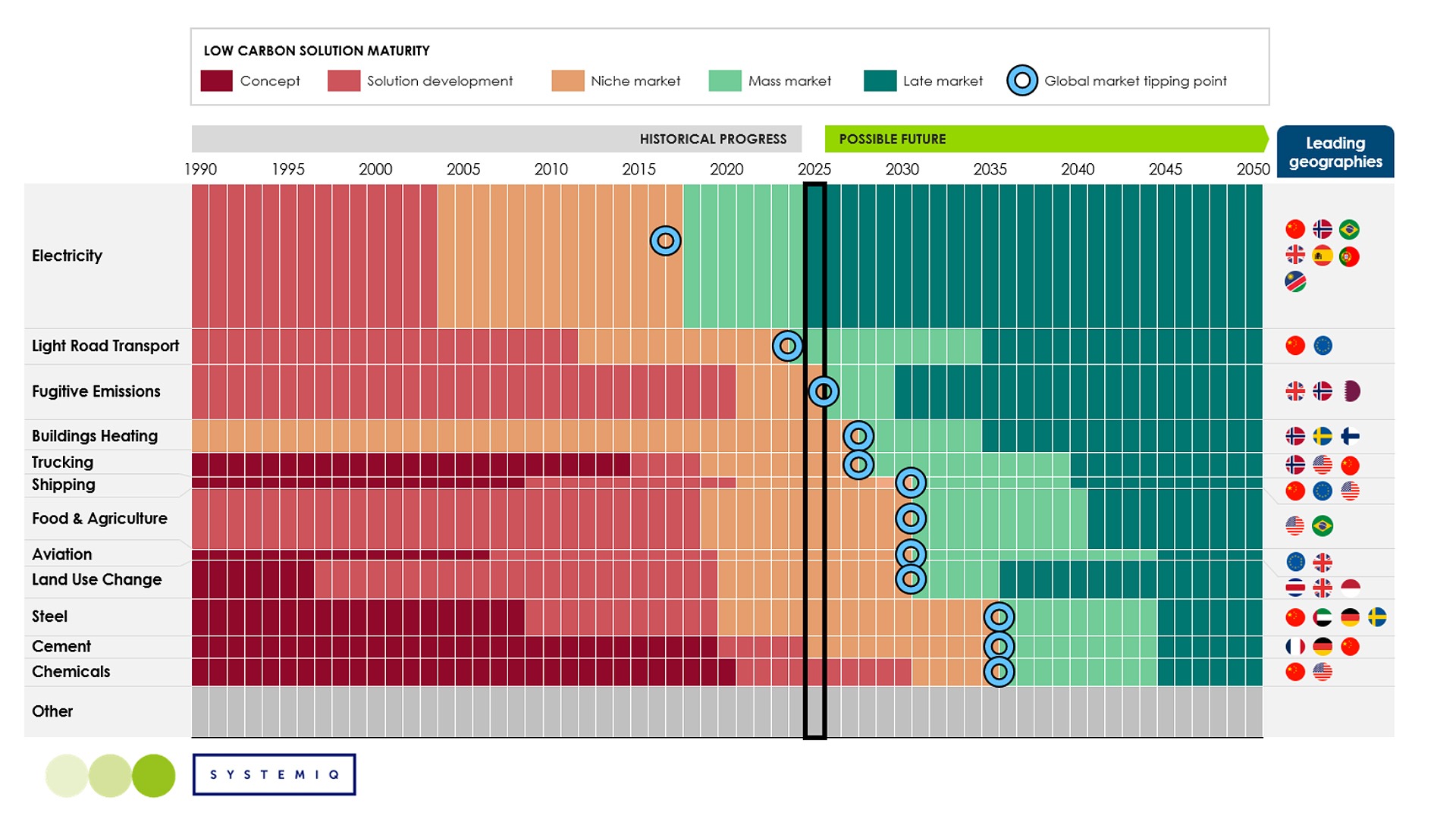Technology tipping points that impact around 40% of global emissions are expected in this decade. There is an opportunity for further acceleration.
This blog highlights research by Systemiq featured at Mission 2025’s flagship event, New Economy Rising, which took place during London Climate Action Week 2025.
This is the decade of decisive positive tipping points. New research by Systemiq and the Energy Transitions Commission (ETC) suggests that at the current pace climate solutions that can abate around 40% of global emissions will be past a tipping point before 2030. Technologies including solar PV modules and battery packs will be or are on an exponential growth trajectory, helping to transform our economic systems and enabling businesses and societies to reduce emissions at pace.

Figure 1 Tipping points for climate technologies in global sectors. Height of sections sized according to impact on global emissions in 2023.
Sources: UN Emission Gap Report 2024, CCPI Index, MPP project tracker (June 2025)
According to research by the University of Exeter and Systemiq for the Breakthrough Effect report, rapid growth commences when a climate technology is more Available, Affordable, and Attractive than the conventional solution and a self-reinforcing feedback loop (such as economies of scale) locks the scale up in. Systemiq has applied positive tipping point thinking and the ‘3As’ to catalyse technology scale up in sectors from textile recycling to alternative proteins, and from long duration energy storage to battery electric equipment in container terminals.
Within the global picture, there are significant regional differences. Technologies do not scale simultaneously in all markets and often a technology breaks through in one sector or country first. A clear frontrunner in renewable energy and electric road transport is China 1, who is also a leading geography in several other sectors. For example, in the trucking sector more than 10% of the sales in China in 2024 were of electric heavy-duty vehicles 2. And in Europe, the Nordics are leading the way in clean technology for the built environment, with heat loss in homes in Norway and Sweden about a third of that in the UK. There is no single reason to explain why some areas progress faster than others, but supportive policies and industry commitments are important for the initial growth phase of climate technologies.
In an earlier stocktake for the Paris Effect an even faster acceleration was projected. Back then in 2021, tipping points in technologies that could impact almost 75% of global emissions seemed possible by 2030. Although progress in all sectors continues, not all have lived up to this potential. The electricity and road transport sectors stay on course, largely because of China driving down costs 3. The shipping sector might also exceed expectations. The IMO’s draft net-zero framework puts a carbon price inside global shipping for the first time, bringing a tipping point in that sector closer 4.
The picture is mixed in other sectors. Climate technologies in regenerative agriculture and land-use do not always have a scalable business case and are expected to take longer to reach a tipping point. The Global Project Tracker from Mission Possible Partnership (MPP) showcases that investments in climate technologies in hard-to-abate sectors are occurring, but at a relatively slow pace.
Accelerating tipping points can bring forward emission reductions and other benefits such as energy independence, increased public health benefits and economic competitiveness. Unlocking these across sectors and regions requires a thorough understanding of the conditions that make climate technologies more affordable, attractive and accessible than conventional alternatives. Commitment from all stakeholders to the breakthrough of climate technologies can ensure that this decade truly becomes the decade of exponential growth – and exponential decrease in emissions.
By Maaike Witteveen, Senior Director at Systemiq, and Mike Hemsley, Deputy Director at the Energy Transitions Commission (ETC).
Further reading:
- On the horizon of the energy transition, a new economy is rising – blog by ETC Chair Adair Turner, based on his speech at Mission 2025’s flagship event, New Economy Rising, which took place during London Climate Action Week 2025.

